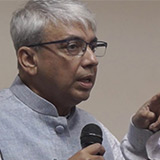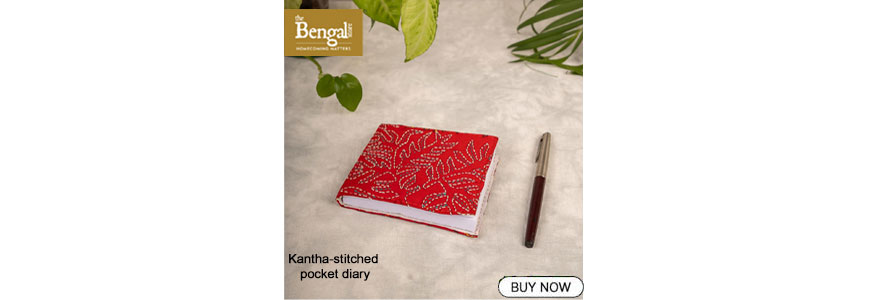A miserable failure in Biology, and I was supposed to be a professor!
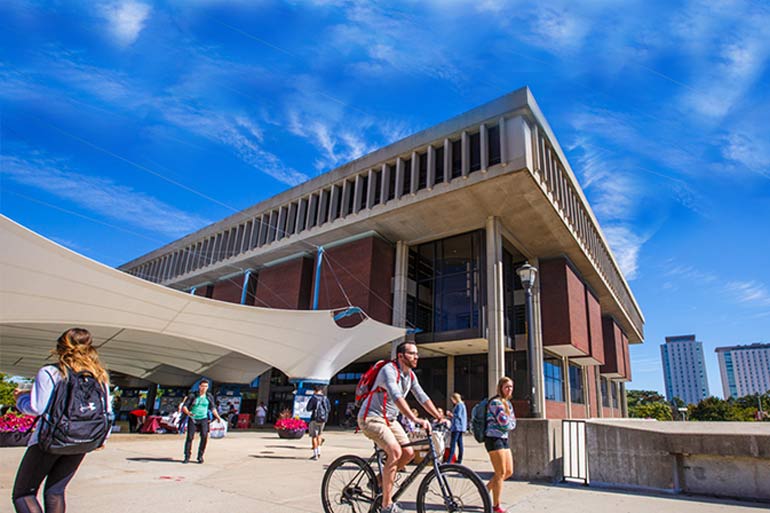
Milner Library - Illinois State University
Soon after the American chapter of my academic career began at Illinois State University, I realised that I may have earned an MSc back home, and appeared as a pundit to the children of the rural college where I taught, but I was merely what they call ‘বাঁশবনে শেয়াল রাজা’ in Bengali, literally meaning ‘a jackal is king in a bamboo forest’. A very rough English equivalent would be, every dog is a lion at home.
And so I would howl at home. As foolish jackals do.
Of course, not everyone was a foolish jackal. I would never dare to thus describe the great teachers and students in a land as rich as India. This is the country which has produced teachers of the calibre of Ishwarchandra Vidyasagar, Rammohan Roy, Akshay Kumar Dutta, Henry Derozio, Rabindranath Tagore, Jagadish Chandra Bose, Prafulla Chandra Roy, Meghnad Saha, Sister Nivedita, Indira Devi Chaudhurani, Sufiya Kamal, Haricharan Bandyopadhyay, and Shibnath Shastri. In my time, I saw the likes of Professor Arun Sharma, Ashima Chatterjee, Susobhan Sarkar, and Lila Majumdar. Or at least heard about them. At Scottish Church School, there were Shyamadas Mukherjee and A.R Roy. Presidency College had Kshaunish babu, Amal babu.
After all, this was why I was in this country, and as I wrote in ‘Ghatikahini’, it was a windfall. The suited-booted Dr Weber presided over our cell biology classes. Outside of the classroom, they were mostly very simple people. Graduate students like us - the equivalent of postgraduate students in India - at the Masters or PhD level were more or less their equals. Because we were teaching undergraduates, taking laboratory classes, so we were truly equals in a way.
And several more great men and women, iconic teachers.
They belonged to a different breed.
But as with most ordinary people in our country, I fell prey to the syndrome of talking too much while knowing very little. What I knew was often inaccurate. Or inadequate. I had never really dived deep into any subject. That the primary purpose of education is to question, to analyse, to go beyond rote learning and try and understand a subject, are things that were not taught to us in our country during my time. We were merely products of the rote learning system that the British had devised to produce clerks.
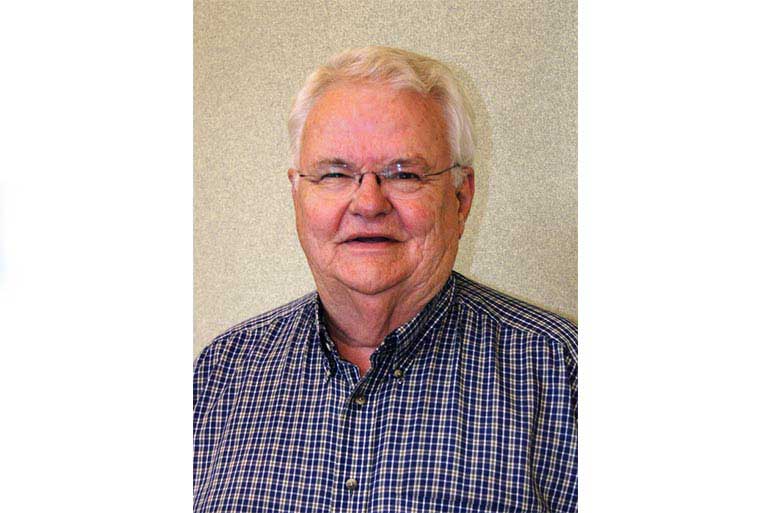 Dr Weber
Dr Weber
Besides, we know-it-all Kolkata boys had our noses firmly in the air. Life had been fairly easy until then - as easy as hailing a taxi or getting on a bus. Where a boy from a village would walk two miles to school, or undergo such hardships as coming to college by boat, sometimes knee-deep in mud, as I saw during my time in the Sundarbans, month after month, year after year; or leave their families behind to lodge with other students, not even getting three square meals a day, simply so that they could complete their studies, we city kids had spent one-third of our time in class at best, the remaining two-third devoted to movies, music, cricket, football, gossip, you name it.
This realisation was driven home to me once I began studying in America. And it chilled me to the bone. Now, it was a struggle for survival, for existence. Even at a medium-level school like ISU, Biology classes made me feel ill. And in fact, I literally did fall ill, unable to take the academic pressure. Let me give you an example, followed by stories of joy and sorrow about my earliest days as a student in America.
Also read :
Hemanta, Manna, and the battle between two super successful Bengalis
How America deals with PNPC…or not!
Would all colour fade from life forever?
Mericamaya Satkahan: Potato chips with rice, and other trials
Mericamaya Satkahan: Living in the USA…on $380 a month
Mericamaya Satkahan: Friendless in a distant land
After all, this was why I was in this country, and as I wrote in ‘Ghatikahini’, it was a windfall. The suited-booted Dr Weber presided over our cell biology classes. Outside of the classroom, they were mostly very simple people. Graduate students like us - the equivalent of postgraduate students in India - at the Masters or PhD level were more or less their equals. Because we were teaching undergraduates, taking laboratory classes, so we were truly equals in a way. Then there was the fact that those Americans who signed up for Masters or PhD classes were completely dedicated students. They were there solely for their research. Someone may have taught high school for a decade, then come back to university. Or someone may have worked as a cop for years, but had always been interested in Biology, and had come back to academics at 50.
I had the same experience when I went to Columbia University for a Masters in Journalism many years later. Therefore, not only was there a shared love for academics, but the age factor too. The professors had a special place for the likes of us, not least because they wouldn’t have been able to handle their teaching schedules without our help.
A few weeks after my arrival at ISU, Dr Weber asked us new students, “Hey guys, what are you up to this weekend?” in his nasal, convoluted American accent. I understood about 70 percent of what he said, the rest I left to God.
We, of course, were up to precisely nothing. In fact, we hardly knew how to get through Saturdays and Sundays. We didn’t know a single soul, and as new arrivals, had virtually no friends. As for going out, where was the money for a poverty stricken group like us? And so we grinned foolishly at Weber’s question. “Looks like you don’t have a plan, do ya?” In response, our smiles widened slightly. Of course we had no plans.
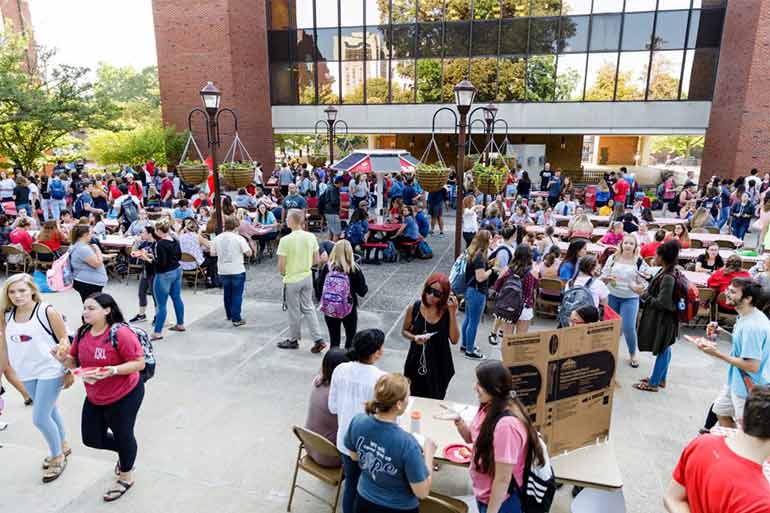 Pizza Party - Illinois State University
Pizza Party - Illinois State University
“Come over to my place. Six-ish, huh?” I had to ask someone what he meant. Possibly Lisa or Tracy, who later taught me how to use a computer, said he wanted us to go to his house at around six in the evening. Weber gave us his address, said it was close enough to walk. Not more than 10 or 12 minutes from the campus. He knew very well that new students couldn’t possibly afford cars, from years of experience.
But as with most ordinary people in our country, I fell prey to the syndrome of talking too much while knowing very little. What I knew was often inaccurate. Or inadequate. I had never really dived deep into any subject. That the primary purpose of education is to question, to analyse, to go beyond rote learning and try and understand a subject, are things that were not taught to us in our country during my time.
Whoo, an invitation! That too to the home of an American professor. No laughing matter. Having chosen my best shirt (out of three) and trousers (out of two), I slipped Weber’s address into my pocket and set out as soon as evening fell on Saturday. The house was huge, but appeared deserted. The surroundings were also deserted and silent as American suburbs are. It was as though a short walk from the campus had brought me to the North Pole. Damn it all, who could I ask?
Oh, there was someone. A man standing on a ladder, painting the first floor of the house wearing a paint-stained pair of jeans and knickerbockers - a word we have adopted from the Americans - or denim overalls with straps at the front and back, and a cap like the ones cricketers wear. I could ask him.
“Iye (there is absolutely no translating this marvellous Bangla word, a filler for all occasions)... excuse me.” The man’s brush paused. And he said, “Yes?”
“Iye…I mean, is this sir, sorry, Dr Weber’s house?”
From his perch, the man once again asked, “You are here to see him?”
What did he mean, ‘see him’? Of course I wasn’t there to see him. He had invited me. Of all the…
I said, “Yes, see him.”
Beginning to descend from his vantage point, the man said, “Wait up.”
Having scaled down the iron ladder, the man took off his cap and smiled slightly.
And then, extending his hand, said, “Welcome to my house.”
“Oh, I did not.. Iye…”, I said. Dr Weber, smiling wider this time, responded with, “Oh that’s quite alright. Come on in.”
By now, my classmates Ranjan, the Chinese genius Mr Zhao, and a few others had arrived. My palms were red. So, no doubt, was my face, I just couldn’t see it.
We followed our professor into the house.
Having feasted on ham sandwiches, bowls of boiled corn, mashed potatoes, and crab apples, chatted endlessly in broken English, and filled in the gaps in conversation with meaningless laughter, we came home in Gordon’s car at around 9.30 at night.
The next Monday, we took a test in cell biology. It was a take-home exam, which meant we could take the question paper home, and write the answers from as many library books as we could manage. I was startled. What kind of exam was this? A week later, I handed in my answer script, which was returned to me two days later. I had scored 45 out of a possible 100, where the pass mark was 60. Chinese genius Mr Zhao had scored 95. Ranjan wouldn’t say how much he had managed, but his face looked wan and dry. Hands in his pockets, he walked rapidly home. I sat on the grass in the quad. I had failed. And I used to teach Biology back home.
(To be continued)
Translated from Bengali by: Yajnaseni Chakraborty
We are happy to present ‘Mericamaya Satkahan’, a weekly column by renowned human rights activist Dr Partha Bandyopadhyay, every Monday on GetBe






